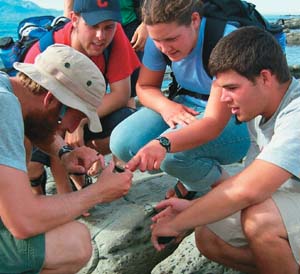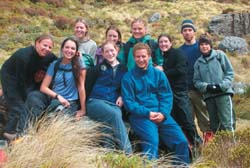 |
 |
| current issue |  |
past issues |  |
send a letter/news |  |
address update |  |
advertise |  |
about us |  |
alumni home |
Features
Classroom with a ViewPage 3 of 3
 EcoQuest students in New Zealand, including Dan Horr '05
EcoQuest students in New Zealand, including Dan Horr '05
|
Along with their study of the environment, the EcoQuest students gained insights into the customs of the Maori, New Zealand's native people, who gave the island its original lilting name, Aotearoa, and who play a significant role in the country's resource management and conservation efforts. During their three-week trip to the South Island, students spend four days on the South Island as guests of the iwi (tribe), which operates a whale-watching franchise. They stay at the marae (gathering place) and observe tribal etiquette and customs. The relationship EcoQuest has cultivated with the Maori means students enjoy the status of tangata whenua (people of the land) whenever they return to Aotearoa.
One of the features of the EcoQuest program is its highly integrated approach to academics, a reflection of the real-life complexity of natural resources management. Each week has a broad theme, such as management of coastal and marine ecosystems or the impacts of eco-tourism. The integration reflects "the connections that exist between the natural environment, and people and their socio-economic and cultural needs," says Ria Brejaart, co-founder of EcoQuest and program director in New Zealand, "which are important in decision-making aimed at sustainable resource management."
 EcoQuester Jillana Robertson '01 fell in love with New Zealand and now helps with kiwi restoration efforts.
EcoQuester Jillana Robertson '01 fell in love with New Zealand and now helps with kiwi restoration efforts.
|
Students also carry out four-week directed research projects known as "DRPs." Recently, in response to growing concern about mammalian predators at the Miranda Ramsar site, a wetland of international significance, EcoQuest students have been involved in tracking and trapping small mammals. To reach the tasty morsels left for them, predators must walk across an ink pad and then across a white board, leaving telltale footprints behind. The information students have gathered will help to determine whether further predator-control efforts are necessary.
For her DRP several years ago, Jillana Robertson '01 researched the Mahoenui giant weta. These large wingless crickets were thought to be extinct until a small number were discovered in 1962. Robertson and several other students caught 100 weta to help establish a population in the Warrenheip Reserve. Now a technical support officer for the Maungatautari Ecological Island Trust, Robertson spends most of her week in Warrenheip, a 40-acre plot protected by a special pest- and predator-proof fence, waiting and listening for signals from the radio tags worn by the few and elusive kiwi.
"Part of the fun of my job is helping people care about bugs and plants and animals, about how much has been lost—and about how much can be saved," she says.
Other students, too, have found their lives altered by their EcoQuest experience. "EcoQuest was the most challenging and most rewarding semester for me as an undergraduate," says Jesse Bishop '02, who stayed on to pursue a master's degree in natural resources from UNH. Bishop is studying five restoration areas around New Zealand, using satellite imagery to assess changes in biodiversity.
 Field trips—like this one to Craigieburn—expose students to the range of New Zealand's ecosystems, from glaciers and tussock country to the South Island's famous braided rivers.
Field trips—like this one to Craigieburn—expose students to the range of New Zealand's ecosystems, from glaciers and tussock country to the South Island's famous braided rivers.
|
"EcoQuest is a change of pace and a change of place that inspires the creative thought process," he says. "You come home a better student, knowing more about yourself." Ultimately, he feels, EcoQuest can help to broaden the perspective of participants and make them better world citizens.
In the voices of these EcoQuest alumni, there's hope, vision and determination. "Every student who participates in the program knows they're leaving something positive behind," says Babbitt. And for Robertson and Bishop, the studying continues, quite literally, in the field. For them, "ecology in action" has become a life philosophy.
Chris Hegan is a freelance writer, photographer, editor and book author in New Zealand. Linda Bercusson, also of New Zealand, is a photojournalist and author of two natural history books. Additional reporting by Suki Casanave '86G.
Page: < Prev 1 2 3Easy to print version
blog comments powered by Disqus

